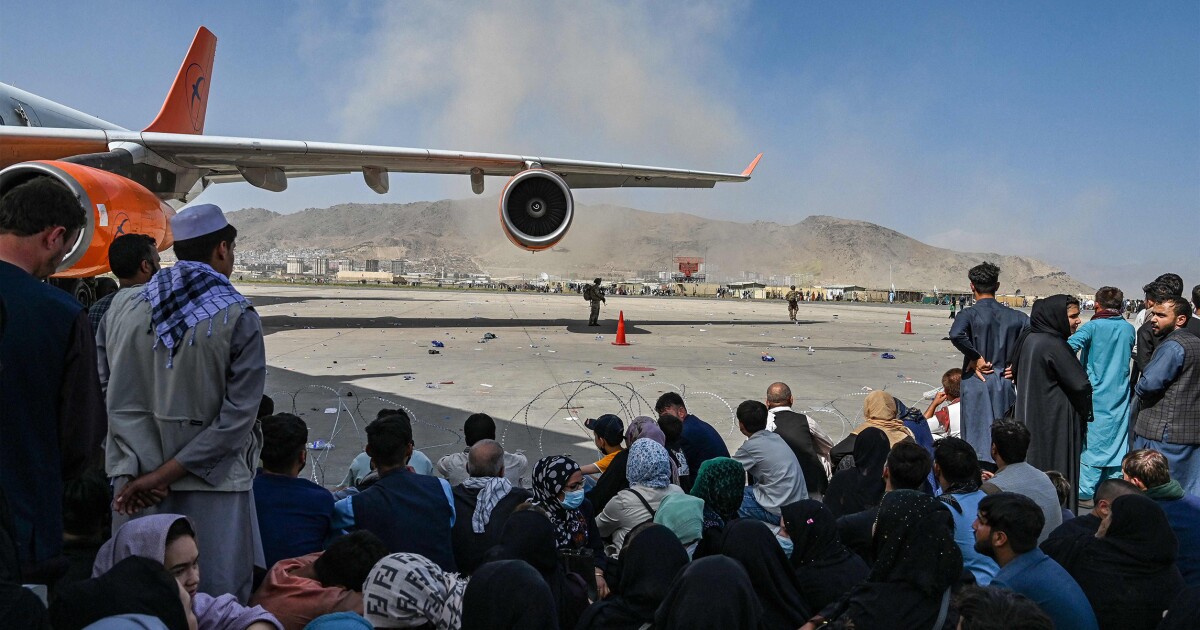

In his last two years in office, former President Donald Trump did everything he could to get the United States out of Afghanistan, an effort that was capped off by a deal with the Taliban in February 2020 to bring all the troops home by May 1 of the following year.
Trump tried his hardest not only to accelerate the withdrawal but also to make it difficult, if not impossible, for any future president to reverse course.
Trump wanted out of Afghanistan from his first day in office. But early on, in the summer of 2017, he allowed himself to be persuaded against his gut feeling to push a strategy that was supposed to convince the Taliban they could not win on the battlefield and force them to the bargaining table.
“My original instinct was to pull out — and, historically, I like following my instincts,” Trump said at the time.
Trump would soon regret his capitulation, fire or force out his first national security advisers, and begin aggressively seeking an exit from what he saw as an expensive failure in Afghanistan.
By 2019, Trump had decided, again against the advice of his national security team, to invite the Taliban leadership to Camp David so he could personally negotiate a peace deal.
But a few days before the planned meeting, Trump abruptly called it off, furious about a car bomb attack in Kabul that killed 12 people, including a U.S. soldier.
Six months later, he finally achieved an exit plan in what came to be known as the Doha Agreement, signed in Qatar on Feb. 29, 2020.
In return for a full U.S. and NATO withdrawal, the Taliban agreed not to attack foreign troops while they packed up, keep terrorist groups such as al Qaeda in check, reduce the level of violence, and negotiate in good faith with the Afghan government.
“The ultimate peace deal, which we negotiated without the elected Afghan government at the table, has to rank among the worst diplomatic agreements to which the U.S. has ever been a party,” said retired Gen. David Petraeus, a former Afghanistan commander.
The problem, Petraeus argued in an essay in the Atlantic, is that successive U.S. administrations talked tough but made it no secret that they wanted out.
“Our enemies knew we wanted to leave, because our leaders had repeatedly expressed that desire. And knowing that, the Taliban realized they had to give up little of value in return,” he wrote.
The agreement was seen by many Afghans as tantamount to an article of surrender and was deeply demoralizing, said retired Lt. Gen. H.R. McMaster, a former Trump national security adviser.
“We delivered psychological blows to the Afghan security forces and to the Afghan people far beyond the physical blows that the Taliban was capable of delivering,” McMaster said last August.
“It seemed as if we did everything we could to weaken the Afghan government and weaken the Afghan security forces on our way out,” McMaster said. “We stopped targeting the Taliban actively, which is why they were able to marshal such military force around cities and to build weapons caches and to begin to coerce local populations and tell them that, ‘Hey, if you don’t accommodate with us now, we’re going to kill you and your entire family.’”
The escape clause in the Doha Agreement was the idea it was “conditions-based” — that is, the final U.S. withdrawal was contingent on the Taliban holding up their end of the bargain.
Trump Defense Secretary Mark Esper had drawn a line, insisting the U.S. would pause the withdrawal at 4,500 troops, the minimum number of commanders believed necessary for continuing the mission assisting the Afghans.
It was clear that only one condition was being met, the promise not to attack U.S. and partner troops. There was no reduction in violence, no good faith negotiations, no breaking of ties with al Qaeda.
Still, when intra-Afghan peace talks resumed after a seven-month delay, during which time the Afghan government was forced to release 5,000 Taliban prisoners who rejoined the fight, the Taliban felt no pressure to make peace, believing they had already won.
“They thought they were there just to discuss the terms of surrender,” a senior Afghan government negotiator told the Pentagon’s Afghanistan watchdog. “They said, ‘We don’t need to talk to you. We can just take over.’”
While the Taliban were reneging on key provisions of the Doha deal, Esper and his military commanders were united in opposition to going forward with the withdrawal. But Trump, intent on getting out, overruled their resistance and ignored the Taliban’s failures.
In October, one month before the 2020 election, Trump surprised his Cabinet with a tweet declaring all U.S. forces should be home by Christmas.
“We seemed to be giving up the best, if not the only, leverage we had to keep the Taliban at the table,” Esper wrote in his memoir, A Sacred Oath. “It was a strategic mistake … and it had an odious psychological effect on our Afghan partners and our relationship with them.”
In early November, Esper wrote Trump a classified letter, in which he said he “made clear that the Taliban was not living up to their end of the deal.”
“My recommendation was that we halt any further reductions until the Taliban met those conditions,” he recounted.
Esper was fired six days later, shortly after the 2020 election.
Trump still wanted all the troops out before he left office, and the Pentagon received orders to complete a full withdrawal by Jan. 15, five days before Joe Biden would be inaugurated.
The order signed by Trump was rescinded, in part because it was logistically impossible and in part because Trump was persuaded the precipitous withdrawal would produce an immediate collapse of the Afghan government, for which he would be blamed.
When Biden took over on Jan. 20, he inherited an Afghanistan mission on its last legs.
Only a skeleton force of 2,500 U.S. troops remained, all but one U.S. base had been turned over to the Afghans, most of the U.S. equipment had been shipped home, destroyed, or given to the Afghans, and the Taliban had cut secret deals with various local Afghan commanders to lay down their arms after the Americans left.
Reversing course was possible but would be a huge logistical and political challenge, and it would mean going back to war with the Taliban after a year in which no American had died in combat there.
“The choice I had to make, as your president, was either to follow through on that agreement or be prepared to go back to fighting the Taliban in the middle of the spring fighting season,” Biden said in a televised address one year ago as Kabul was falling and the debacle of the frantic evacuation operation was unfolding.
At a rally in Ohio three weeks before Trump crowed about how he had successfully boxed Biden in, he told the crowd: “I started the process. All the troops are coming back home. They couldn’t stop the process. Twenty-one years is enough, don’t we think? Twenty-one years. They couldn’t stop the process. They wanted to, but it was very tough to stop the process.”
Jamie McIntyre is the Washington Examiner’s senior writer on defense and national security. His morning newsletter, “Jamie McIntyre’s Daily on Defense,” is free and available by email subscription at dailyondefense.com.






